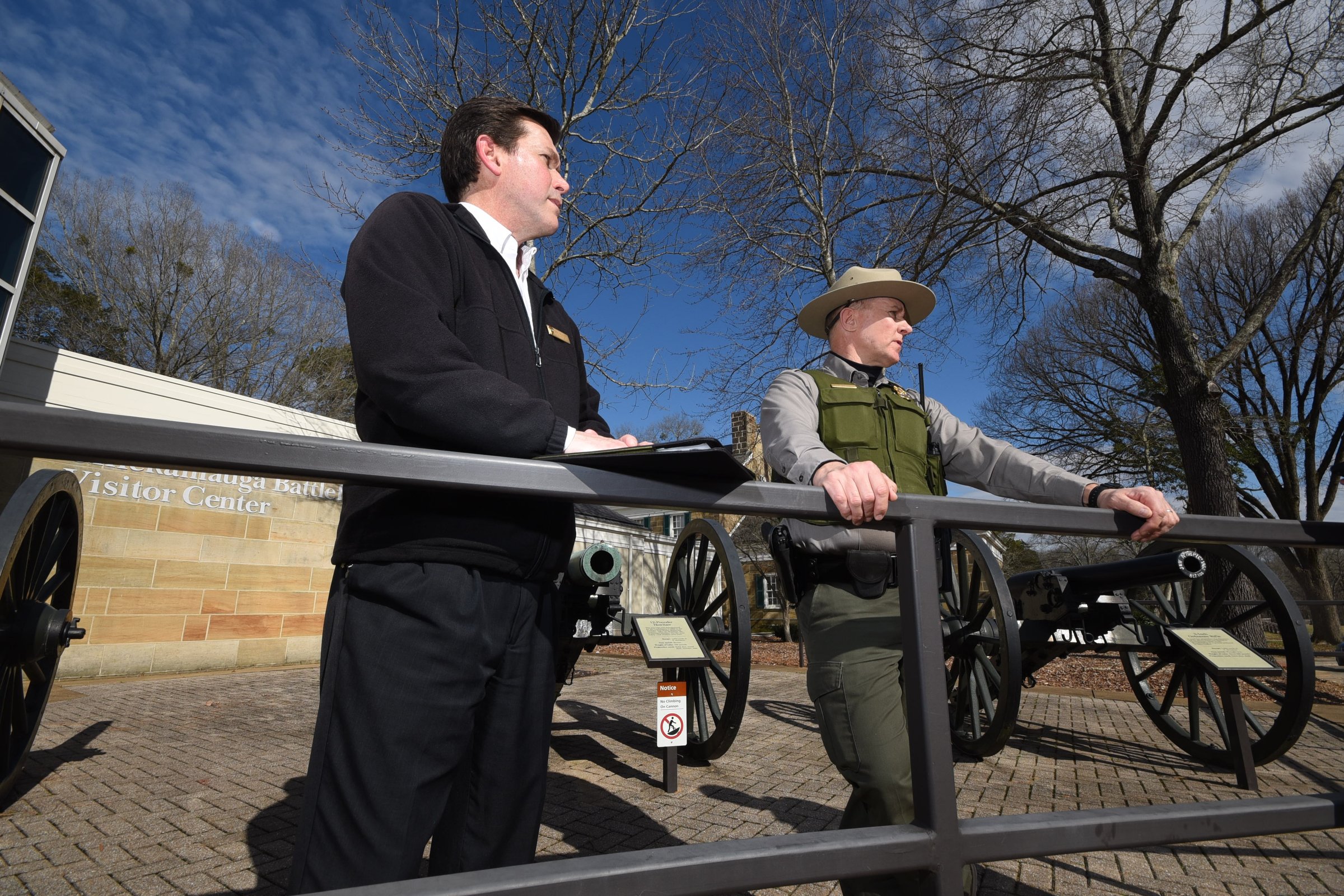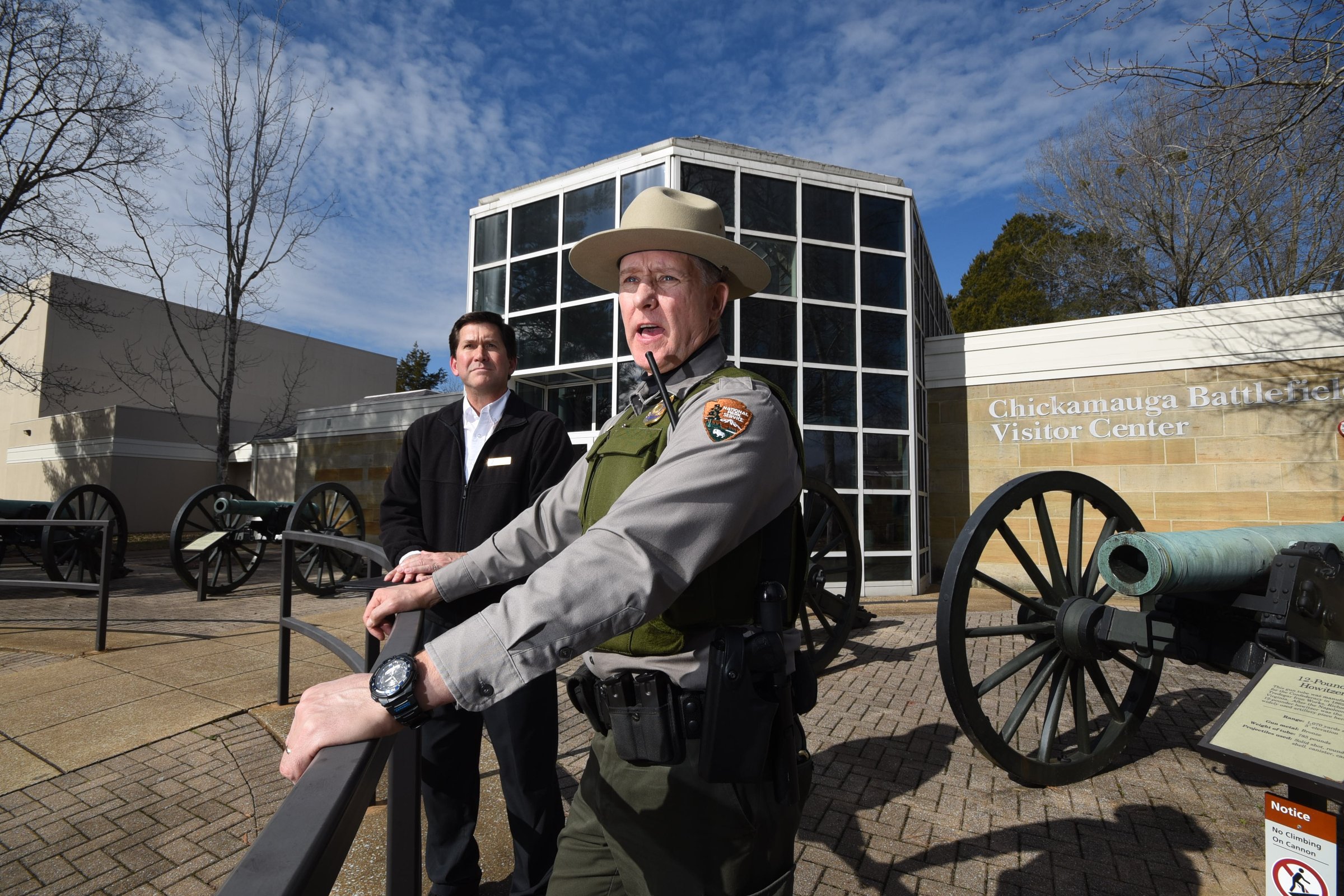Furloughed National Park Service employees returned from the longest government shutdown in U.S. history pleased with the Chattanooga area's respect for public land after a month of frustration that kept many employees home, without pay and away from the jobs they love.
Horror stories at other National Park facilities have been widely shared: feces build-up, litter, destruction of property and more. Area park service employees at the Chickamauga and Chattanooga National Military Park said they were eager to get back to work and thrilled to see how well citizens took care of the park in their absence. There was no trash build-up, little littering and no destruction.
"There was very little trash. We appreciate the public for taking care of the park," chief ranger Todd Roeder said. "I believe we did have some groups come in on weekends to help pick up trash if they saw it. That we're grateful for. That was the surprising thing, though, driving around and not seeing much trash. We saw the pictures in Washington, D.C., and other places. We had nothing like that here."
Roeder and his staff of rangers were required to work for free for more than a month to ensure safety. All other employees were furloughed. There was a lot of frustration during the shutdown, he said. Eventually, the government approved back pay and employees were compensated for the missed pay, but that wasn't a certainty throughout the shutdown.
Work was different for those weeks, Roeder said. He walked through empty buildings with the lights off in the middle of the day, no employees bustling about, the heat turned down and the park largely empty. He fielded calls from the park service's regional and national offices with updates on the shutdown. The desk work he needed to do largely couldn't get done, so he spent more time patrolling the properties.
But even that was lonely with few visitors, little staff and a largely empty facility. Employees got together for a potluck dinner and get-together to raise spirits, and then it was back to waiting for the federal government to approve funding.
Park leaders were guided to not open anything that was typically locked during the night. The vast green space the park offers remained open, but Point Park and visitor centers were closed. All events were canceled.
"If you're a first-time visitor to a national park, the first thing you always do is get to the visitor center, get a map and brochure, find out what programs are happening and get oriented," Park Superintendent Brad Bennett said. "The opportunity to learn about the park's significance, to watch the film, to see the exhibits, to talk to rangers to plan, all of that was shut down."
The park saw a double-digit drop in visitation year over year because of the shutdown, Bennett said. The system usually sees about 1 million visitors each year; that number was down 10 percent over the last 12 months. The biggest concern was the impact to the local economy. Every year, the park service calculates the economic benefit visitors play in the community. That will likely see a dip this year.
"Typically, the cumulative economic benefit is close to $70 million a year, but we know if folks aren't coming to the Chickamauga and Chattanooga National Military Park, that means they're not staying in area hotels, eating in area restaurants, going to other tourist attractions," Bennett said. "The ripple effect economically is much bigger than how it affected us as federal employees."
For furloughed employees, it meant a month at home without pay as events they spent considerable time planning were canceled.
It was frustrating to watch time go by as events passed, park guide Lee White said. An event about the history of Moccasin Bend, a planned guest speaker and a battlefield-centric history event were all canceled.
"People say it's like a vacation," White said. " But we were really glad to get back. This is something we really care about, this place. Getting back was important to us."
Area groups - Fort Oglethorpe Church of the Nativity, Catoosa County Parks and Recreation, Mizpah Congregation, Chattanooga Area Food Bank and others - provided support and food for workers. A group of McCallie and Girls Preparatory School students came on Martin Luther King Jr. Day to help take care of the property.
Then, employees got a sudden notice the government was back up and running. Funds had been appropriated and employees were to report to work Jan. 26.
"It was great " Roeder said with a smile. "Just walking through the visitor center again with the lights on."
Contact staff writer Mark Pace at mpace@timesfreepress.com or 423-757-6659. Follow him on Twitter @themarkpace and on Facebook at ChattanoogaOutdoorsTFP.


